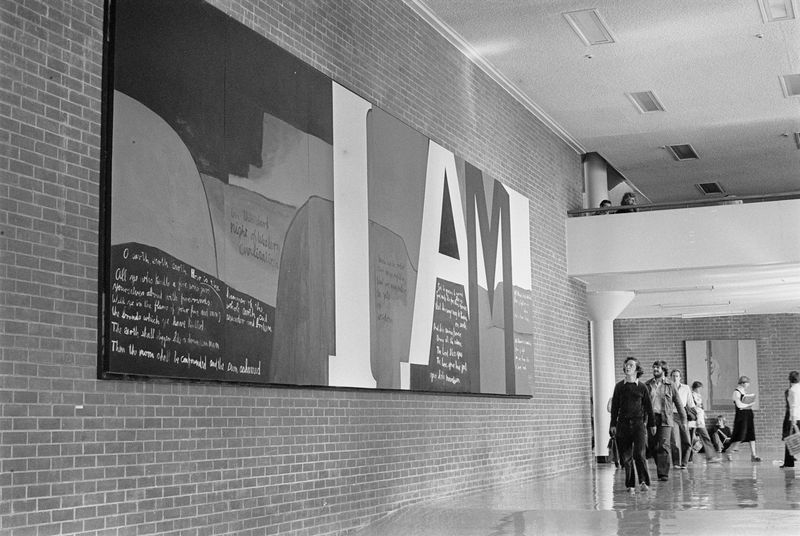Signs and symbols to live by? — Colin McCahon, Gate III and contemporary practice
Te Uru Waitākere Contemporary Gallery
21 September 2019
A panel discussion led by Ron Brownson with Ralph Paine, Bepen Bhana and Emily Karaka on McCahon's Gate III

View of Colin McCahon’s Gate III on display at Victoria University of Wellington in the 1970s (photo: Dominion Post, Wellington)
A panel discussion led by Ron Brownson with Ralph Paine, Bepen Bhana and Emily Karaka on McCahon's Gate III
Colin McCahon considered visual art to be signs and symbols for people to live by. He wanted his art to have the moral and spiritual urgency that he admired in the historical art of churches. In 2019 how does the work of Colin McCahon and contemporary art practice relate to this idea?
Gate III was originally commissioned by Auckland Art Gallery for their 1971 ’Ten Big Paintings’ exhibition. It has returned to Auckland for the first time since that show and features in the Te Uru exhibition ‘A way through’ Colin McCahon’s Gate III. Join us for what promises to be an energetic discussion exploring ideas of art practice, and the currency of Gate III in 2019.
Ralph Paine is an artist who lives in Tāmaki Makaurau. Recent exhibitions include Errantries, Window Onsite, University of Auckland, 2013; Ltd, Snake Pit, Auckland, 2012; Resident Gods, Everything Begins With Houses Project Space, Auckland, 2011; In the Hills Near Fabriano, Gambia Castle, Auckland, 2010. He recently contributed to McCahon 100.
Bepen Bhana is an interdisciplinary practitioner based in Tāmaki Makaurau Auckland. He was the Parehuia McCahon House Artist in Residence at the beginning of 2016 when his Frankie Goes To Bollywood project was concurrently exhibited at Te Uru Waitākere Contemporary Gallery. Other recent solo exhibitions include Hey Bey – Hymn For The Weak End at Fresh Gallery Ōtara and The Land Of Milk & Curry at All Goods – Whau Arts Space. As a graduate of the Elam School of Fine Arts at The University of Auckland, Bhana was awarded the Elam Art Scholarship, Senior Scholarship in Fine Arts and the Fowlds Memorial Prize.
Emily Karaka was born in Auckland in 1952 where she continues to live and work. She belongs to the Tāmaki Makaurau hapu (sub-tribe) of Ngai Tai. Karaka has exhibited regularly since 1980 and cites artists Colin McCahon, Philip Clairmont, Allen Maddox, Ralph Hotere and Tony Fomison among her mentors. Karaka is a well-known land claims activist, and is respected as a strong force in the Maori art movement of the 1980s.
Ron Brownson is Senior Curator at Auckland Art Gallery Toi O Tāmaki, and co-curator of A Place to Paint: Colin McCahon in Auckland
For the year from August 2019, McCahon House is organising a series of nationwide events to celebrate the legacy of Colin McCahon. ‘A way through’ is an exhibition developed and toured by the Adam Art Gallery and presented at Te Uru for the centenary year. This panel discussion takes place as part of Art Month, organised by the Arts Foundation, and is a collaborative initiative between Te Uru and McCahon House.
All welcome.